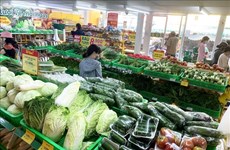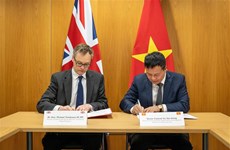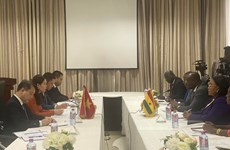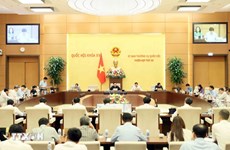APEC Secretariat Executive Director highlights Vietnam's hallmarks in APEC 2017
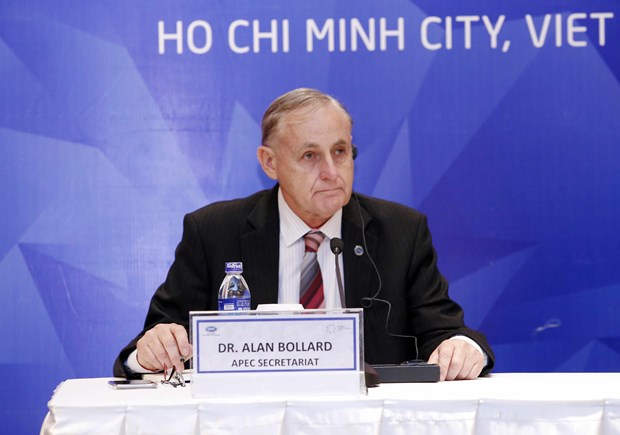 Alan Bollard, Executive Director of the APEC Secretariat (Photo: apec2017.vn )
Alan Bollard, Executive Director of the APEC Secretariat (Photo: apec2017.vn )Hanoi (VNA) - Dr. Alan Bollard, Executive Director of the APEC Secretariat, has highlighted Vietnam's role and contributions as well as its hallmarks in hosting the APEC Year for the second time in an interview granted to the Vietnam News Agency. Following is the full text of the interview.
1. What do you think about Vietnam’s role in and its contribution to APEC since its admission to the forum in 1998?
Vietnam has
been a very active member of APEC for almost 20 years now. Initially when it
joined, it was quite a poor economy but appeared to look at the APEC vision of
opening up trade to get growth in the region and it has done that very
succesfully.
Just
over a decade ago in 2006, it hosted the APEC year and the leaders met
in Hanoi at the end of the year and from that year we see
contributions to improving capacity building across a range of APEC
initiatives.
As a
lower income economy, Vietnam was able to realise that in order to achieve many
of the stated APEC goals requires more capacity building and training to go on
not just in Vietnam but in other economies as well.
2. What
do you think about the theme and the priorities for APEC Vietnam 2017?
For
2017, Vietnam has a theme on “Creating a dynamism and fostering a
shared future”, which is very general and wide enough to include the whole
range of initiatives going on in APEC. The 4 particular priorities focus us on
the important work. Vietnam got agreement to this at the beginning of
the year and propose them as their own initiatives. During the year other economies have also contributed
other initiatives. The themes continue the important
multi-year work of APEC as well.
There is
a theme on promoting sustainable and innovative growth which reflects the fact
that we now realise we have to focus much more not just on growth rates but
on how to achieve and who benefit from them. That was a clear message
from APEC leaders at Lima last year.
There’s
another priority on regional economic integration which continues the way we
have been looking at the regional trade agreements in the region, of course
some of these have been changing during the year.
In
addition, looking at the way that a free trade area for Asia Pacific concept can be used to help bring these together and help them
converge and in addition looking at a whole range of
other initiatives such as supply chains which help
connect up the economies.
The
third priority has been on modernizing micro, small and medium enterprises. In
a digital context, that’s been very important because we are hoping to see
further development on agreement around the electronic commerce in APEC, which
will help facilitate small businesses in the region which of course foster the majority businesses to join in and enjoy
some of the benefits of regional trade and investment.
The
fourth priorty has been on food security and particularly in the context of
climate change, reflecting some concerns that Vietnam and other economies
have..., putting foot security at risk. There was a
lot of initiatives proposed during the food security
week held
in Can Tho.
3. What
do you think about the changing trading envirionment and how would that
impact APEC’s pursuit of the co-called Bogor goals
and regional economic integration, the pursuit of free and open trade in the
region. What do you see that going during this Vietnam APEC
year?
Bogor
goal was a commitment towards free and open trade and developed
economies by 2010, which was largely achieved but not entirely and
still requires some ongoing work and in developing economies by 2020, so a couple of years away. We have been under Vietnam’s leadership monitoring progress towards those goals
and we continue to see some advancements in many areas
particularly behind the borders around structural
reform and rigorous change.
But
there is further work that still needs to be done to achieve
these. Of course we have also over the last year
seen some other views on trade policy developments,
that will be one of the important areas of discussion amongst leaders in Da Nang as to how we balance out the desire to continue the free and open trade with some
concerns that some economies have got about the
rules of trade.
4. And related
to that, of course there has been this rise in
anti globalisation sentiment and anxieties about things like automation and the loss of job in higher
industries. How is APEC addressing that under Vietnam’s leadership?
We know that we need to focus more on not just the
overall benefit of trade to the economies but the extend to which some parts or
some communities within the economies could get hurt by this and to address
that Vietnam has put in place an initiative on economic inclusion, financial
inclusion and social inclusion to try and ensure that we can design policies
that benefit more broadly or could also mitigate and cushion part of the
economies that could be hurt by them. That’s ongoing work.
5. Finally looking ahead, what do you hope to see
is the legacy of APEC host year 2017 and how would that fit in with APEC’s
planning and agenda heading into the new decade
Vietnam’s legacy for hosting APEC has been most
importantly to keep alive the important initiatives going forwards at the
time of complicated globalisation and concern about some of the directions and
keep that going by being quite inclusive across different economies.
Looking forwards, Vietnam is looking to put in place an
agreed process whereby we can can study a direction for APEC from 2020 onwards.
A number of APEC programs such as Bogor goals terminate in 2020 and it’s a chance for us to look at whether we want to see APEC
continuing on the same lines or incorporating some new ideas or responding to
new some restructural changes over the next few years.
So Vietnam is arranging approaches for that to start work
over the next two years.
Thank you very much!









